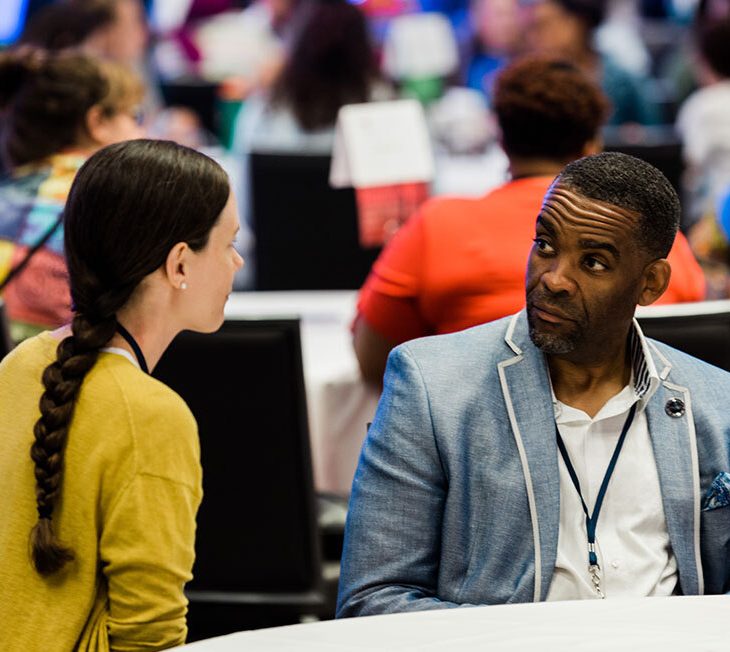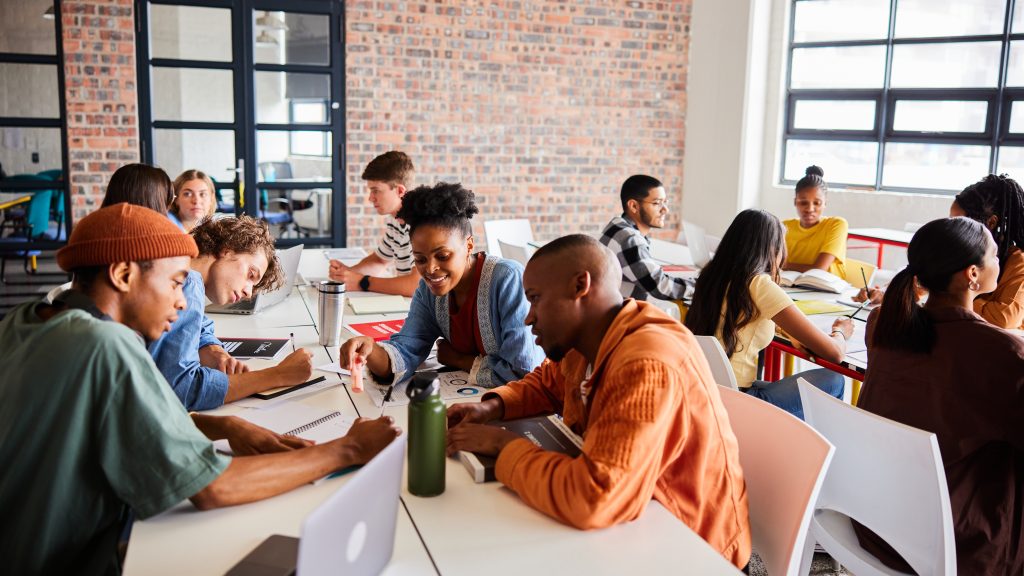Two Trainers Share How to Make the Most of the Interfaith Leadership Summit
June 16, 2022

The Interfaith Leadership Summit is the nation’s largest gathering of students and educators with a commitment to American religious pluralism. Registration is open for this year’s in-person Summit, to be held August 12-14 in Chicago. A longstanding signature program of Interfaith America, the event attracts attendees of different religions and worldviews who learn skills to build connections, forge friendships, and be bridgebuilders on their campuses.
Lisa Doi and the Rev. Byron Tyler Coles, part of the Interfaith America Emerging Leaders Network, are trainers at this year’s event. In a recent Instagram Live conversation with Interfaith America’s Harmeet Kaur Kamboj, they share their journey, their favorite parts of the convening, and advice for first-timers attending the Summit this summer.
The conversation has been condensed for clarity.
Share
Related Articles
What brought you to Interfaith America and how did you get involved in the Emerging Leaders Network?
- 1
Lisa Doi
I got connected to Interfaith America through the Interfaith Leadership Institute, which is now the Interfaith Leadership Summit. I participated when I was a student in college, and I grew up in a Shin Buddhist community in Chicago, and when I went to college in Philadelphia, there wasn’t a temple nearby. So, I really turned to my university’s chaplain’s office and the interfaith programming on campus as a place to continue a spiritual life in a moment in time when I didn’t have my own faith community close at hand.
- 2
Rev. Byron Tyler Coles
My relationship with Interfaith America also began with the Interfaith Leadership Summit. My first summit gathering was at the Interfaith Leadership Institute in 2012 when we were gathering in Philadelphia, and that was the result of doing community organizing on my college campus. I am a Unitarian Universalist and a pagan, so I hold multiple religious identities. Roanoke College, the institution I attended, is historically Lutheran. And I had noticed all these people of different religious backgrounds intersecting with one another, but not deeply engaging with one another, especially with all of the resources and concerns and pressing needs within our community, both on and off campus. And one of my mentors at the time and mentor today said there’s this really great organization that trains college students to figure out and discern how to do interfaith work on their campus. And it has been a beautiful, unexpected journey ever since.
What inspired you to become a trainer for the Summit?
- 1
Rev. Byron Tyler Coles
It is an honor to come back and work with colleagues in the movement, to be in the space and just to share in conversation with other people. It is always worth being in conversation with other people who are thinking about how we can use the lens of interfaith cooperation in a world that is on fire. And I always leave challenged and inspired.
- 2
Lisa Doi
I’ve gotten to participate virtually in the past few years. I’m looking forward to getting to be in person and seeing people in real life. There is something that really is magical about in person spaces and having those conversations in between the things that are planned.After the ILI in 2012, I spent some time not as connected to interfaith organizing work. So, in the past six-ish years now I have found my way back. For those of you maybe are new to interfaith work or have taken a break from interfaith work, I think that’s one of the things I value about these spaces, that it can be something that you come back to over time.
How did attending the Summit as a student inform your practice as a trainer?
- 1
Lisa Doi
When I think about really strong examples of facilitation, it’s about people who can create spaces where the group can make it into what they need. When we were doing our trainer prep meeting, I thought about what I value in myself as a trainer, and about how knowledge and power are being constructed in the room where we gather. What can I do to try to upend existing systems of power? And maybe, as the person who’s been assigned the role of trainer and been maybe assigned a position of authority, what can I do to try to acknowledge that knowledge is coming from many parts of that space we are in? And not to see me as sort of the source of knowledge to hand down to other people, but as a space that can sort of co-create the knowledge that we need together.
- 2
Rev. Byron Tyler Coles
Interfaith America was the space where I first came to movement work. And it was the space where Adam Garner was the first person that ever called me an organizer. One of the things I find most yummy to chew on as a trainer is creating that space that really gets at the heart of empowering this next cohort of leaders. Leadership has always been hard, has always been challenging, and has always been soul-shaking. At this moment, it is even more true. One of the things that I hold intently when I’m in facilitating a training space or cohort, whether it is with Interfaith America or any of the spaces that I facilitate, is one, to create a container where people themselves feel empowered to do really hard work. And then two, to encourage us to have really challenging conversations. How do we talk about power? How do we talk about privilege? How do we talk about the histories of how our communities sometimes come into conflict with one another and have been in conflict with one another, and then also give a heavy dose of the yummy medicine that we all need — the medicine of joy, the medicine of resistance, the medicine of liberation.
What are you most looking forward to at the summit this year?
- 1
Rev. Byron Tyler Coles
We have been radically changed in the last few years. We are not the same people who we were 24 months ago, and even who we are now, and who we will be in August, we will probably change three times between now and then too. And I’m really excited to share space with other folks who have changed so much in such a small period of time, and to see what questions we are bringing, not only about like the work but also about ourselves as people and how our worldviews have responded to this historic moment that we are still currently living through.I I love the questions. I love the challenges. I love the conversations. I am really looking forward to just being with other folks and eating in one shared space and laughing and being in a joyful community.
- 2
Lisa Doi
I’m looking forward to the time between the times where we have things planned to just be able to sort of like have a follow-up conversation in the hallway. That to me is one of the things I so value about in-person space, just those kinds of conversations you have while you’re filling up your water bottle or over a meal that really, I think enhance the planned programmatic activities.
What’s one quick piece of advice you have for first timers at the Summit?
- 1
Lisa Doi
I am always a fan of asking questions. Think about what questions you want answered and be open to the questions you didn’t even know you want answers to.
- 2
Rev. Byron Tyler Coles
Take the opportunity and get to know other people in your cohort, take the opportunity and get to meet other people in the hallways, or just like sit down at a random table during the breaks. The community that we form with one another at the summit is literally life-changing. Some of the individuals with whom I shared space in my own cohort room in 2012 are people that I’m still in contact with to this day. And like we’re getting married and having babies and graduating with PhDs and stuff now, and we are not only doing work together, but we are traveling together. I didn’t expect that from the summit, and I am so wildly thankful for it.
Rev. Byron Tyler Coles is a Southern-raised native of Roanoke, VA. They hold a Bachelor of Arts in history and religion from Roanoke College and a Master of Divinity from Vanderbilt University. Inspired by the good news of Unitarian Universalism, Tyler is a Candidate for the Ministry with interests in community worship and justice-making. This work includes interfaith organizing, supporting young adults, the facilitation of LGBTQ+ spirituality communities, and continuous efforts toward “creating the Beloved Kingdom on earth.”
Tyler also serves as the communications co-chair of Diverse & Revolutionary Unitarian Universalist Multicultural Ministries (DRUUMM). DRUUMM is a People of Color ministry and anti-racist collective bringing lay and religious professionals together to overcome racism through resistance and transform Unitarian Universalism through multicultural wisdom.
Lisa Doi is an organizer with Tsuru for Solidarity, a national network of progressive Japanese Americans organized against detention and incarceration. Locally, Lisa is also the president of JACL Chicago, a civil rights organization, and a member of the Midwest Buddhist Temple, a Shin-Buddhist congregation in Chicago’s Old Town. Academically, Lisa is a Ph.D. candidate in American Studies at Indiana University. Her research looks at Japanese American community pilgrimages as a form of public memory and community-directed history. Lisa is an avid reader and is currently enjoying lots of bike rides around Chicago.



